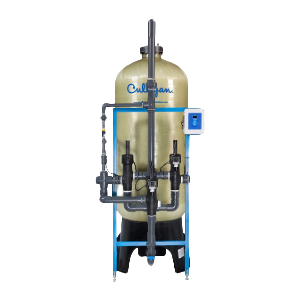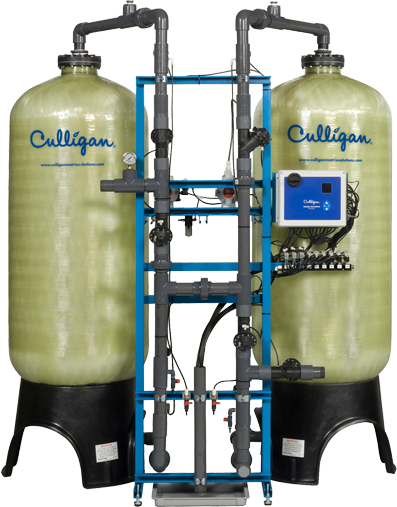All the benefits of commercial water filtration without the ridiculous costs.
Cost-effective water filtration systems for commercial & industrial.
-
Enhanced Quality
Water filtration systems remove contaminants like sediments, chlorine, heavy metals, and bacteria, ensuring water is safe for consumption, industrial use, and meets health standards.
-
Extended Lifespan
Filtration prevents scale buildup and corrosion in equipment, extending its lifespan, reducing maintenance costs, and improving efficiency.
-
Cost Effectiveness
By preventing equipment damage from poor water quality, filtration systems offer significant long-term cost savings through reduced repairs and replacements.
-
Regulation Compliance
Water filtration helps businesses meet strict regulatory requirements, avoiding fines and legal issues related to water quality.
Why Culligan?
- No third-party installation. No big box retailers. Full-Service high-quality water
- Customized to fit YOUR water needs. Your neighbor’s home, your parents’ home across town — their home water situation may be very different from yours. Culligan works for your tap, your family, your home
- Security: Limited 20 year warranty, No shipping damage worries, no restocking fees!
Commercial & Industrial
Industries We Serve
Culligan of Oklahoma City meets the unique needs of industrial customers with a personalized approach, catering to every use—from the misting water in grocery stores and hotel laundry systems to water for oil field steam injection and high-purity water for pharmaceutical production. Their process includes on-site surveys, in-depth analysis, and expert service to deliver tailored solutions. We are thrilled to serve the following industries:
- Chemicals
- Consumer Goods
- Energy / Oil / Gas
- Food & Beverage
- Hospitality / Lodging
- Healthcare
- Steel
- Pharmaceuticals
ANSI / AAMI ST108
Are You Prepared?
In 2023, a new standard for water quality in medical device processing arrived, which replaced outdated guidelines and made the bar higher for patient safety. Culligan Texas specializes in helping healthcare providers understand and implement water grades for different stages, design systems and monitoring, and working with your water management platform.

You Have Questions
We Have Answers
What types of contaminants do commercial water filtration systems remove?
Commercial water filtration systems eliminate various contaminants like sediments, chlorine, heavy metals (such as lead and mercury), organic compounds, bacteria, viruses, and dissolved solids. The specific contaminants removed depend on the filtration technology used, such as activated carbon, reverse osmosis, ultrafiltration, and UV sterilization.
How do I determine the right commercial water filtration system for my business?
Selecting the right system involves assessing your water quality needs, the volume of water required, and the specific contaminants present in your water supply. Contacting your local water treatment specialist to conduct a water quality test is essential to identifying the contaminants and recommending the correct system to meet your unique water needs.
What are the maintenance requirements for commercial water filtration systems?
Maintenance requirements differ based on the system’s type and complexity. Usually, it involves monitoring water quality, replacing filters and membranes, cleaning components, checking for leaks or damage, and conducting routine inspections and preventive maintenance.
How much do commercial water filtration systems cost?
Commercial water filtration systems vary in cost based on type, capacity, and technologies used. Basic systems start at thousands of dollars, while more advanced systems can cost tens of thousands or more. It is important to consider upfront costs and long-term expenses when budgeting for a system.
What are the benefits of using a commercial water filtration system?
The main benefits of using a commercial water filtration system are improved water quality, protection of equipment from scale and corrosion, cost savings through reduced maintenance and repairs, and compliance with health and safety regulations.





Facebook